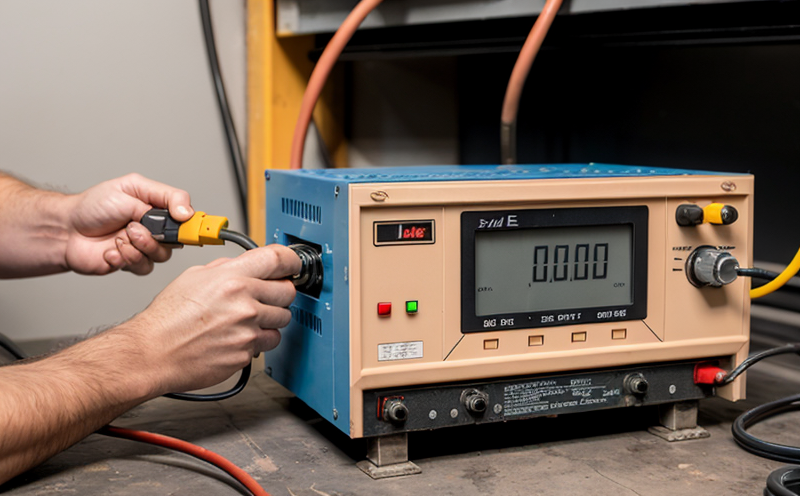JEDEC JESD22-A108 Die High Temperature Operating Life Testing
The JEDEC JESD22-A108 test is designed to evaluate the reliability of semiconductor dies under high-temperature operating conditions. This test is critical for ensuring that microchips and other electronic components can withstand the harsh environments they may encounter in real-world applications.
High temperature testing, especially when it involves prolonged exposure, helps identify potential weaknesses or failures in the die's insulation layers, interconnects, and overall construction. By subjecting the die to high temperatures for extended periods, engineers can uncover issues that might not be apparent under more benign conditions. This is particularly important given the increasing miniaturization of components and the rising operating speeds required by modern electronics.
The JESD22-A108 test provides a standardized method to simulate real-world stressors on microchips, thereby allowing manufacturers to ensure product reliability before commercial release. The test protocol specifies that the die should be subjected to temperatures up to 250°C (482°F) for durations ranging from 1000 to 3000 hours, depending on the specific requirements of the semiconductor device being tested.
During the testing process, it's essential to prepare the samples correctly. The die must be mounted in a suitable holder that can withstand high temperatures without affecting the test results. Additionally, any external connections or leads need careful attention to ensure they do not interfere with the temperature distribution within the sample. Once prepared, the sample is placed into a controlled environment chamber where it undergoes heating and cooling cycles.
For accurate measurement of thermal properties and performance metrics, sophisticated instrumentation such as thermal cameras and data acquisition systems are used. These tools help monitor changes in the die's surface temperature and internal resistance over time. The results from these measurements provide valuable insights into how well the die can maintain its functionality under extreme conditions.
The output of this testing process includes detailed reports outlining observed behaviors during high-temperature exposure, including any signs of degradation or failure modes identified. These findings are crucial for refining manufacturing processes and improving overall product quality.
Compliance with JESD22-A108 ensures that manufacturers meet industry standards set forth by JEDEC, a leading authority in semiconductor technology specifications. Adherence to these guidelines helps maintain consistency across different batches of products and builds trust among consumers regarding the longevity and performance reliability of electronic devices.
Why It Matters
The significance of high-temperature testing cannot be overstated in today's rapidly evolving technological landscape. As semiconductor technology continues to advance, so too do the demands placed upon these tiny components. With ever-increasing computational power and smaller form factors come new challenges related to thermal management and durability.
- Ensures product reliability: By simulating extreme environmental conditions during production, manufacturers can catch potential flaws early on.
- Promotes safety standards: The rigorous nature of this test helps prevent accidents caused by premature failures in critical systems like automotive electronics or medical devices.
- Supports innovation: Understanding how materials behave under stress allows researchers to develop more robust designs for future generations of semiconductors.
In essence, the JESD22-A108 test plays a vital role in safeguarding both end-users and manufacturers by providing assurance that their products will perform consistently across various operational scenarios. This not only enhances customer satisfaction but also fosters greater confidence within industries reliant on advanced semiconductor technologies.
Scope and Methodology
The scope of JESD22-A108 encompasses the evaluation of die-level electrical characteristics and functional performance over extended periods at elevated temperatures. This includes assessing parameters such as leakage current, threshold voltage shifts, and overall circuit behavior.
The methodology involves placing a semiconductor die into a controlled environment chamber capable of maintaining precise temperature settings within narrow tolerances. The sample is exposed to constant or cyclic heating up to 250°C for durations specified by the test protocol. During this time, continuous monitoring of relevant electrical parameters takes place using advanced measurement equipment.
Acceptance criteria stipulate that no significant changes should occur in key metrics such as resistance values or capacitance levels throughout the prescribed testing period. Any deviations from expected results would indicate a need for further investigation into design modifications or material selection adjustments.
Industry Applications
The JEDEC JESD22-A108 test finds application across various sectors where high reliability and performance are paramount. Here are some key areas:
- Aerospace: Ensuring that avionics systems remain functional during re-entry into Earth's atmosphere.
- Automotive: Verifying the integrity of electronic control units in vehicles operating under extreme heat conditions.
- Medical devices: Confirming the stability of implantable sensors and other critical components subjected to body temperature fluctuations.
- Data centers: Guaranteeing that servers and storage solutions continue to operate efficiently even when faced with unexpected surges in processing demands.
In each case, adherence to JESD22-A108 helps ensure compliance with regulatory requirements while enhancing the overall quality assurance process for these complex systems.





